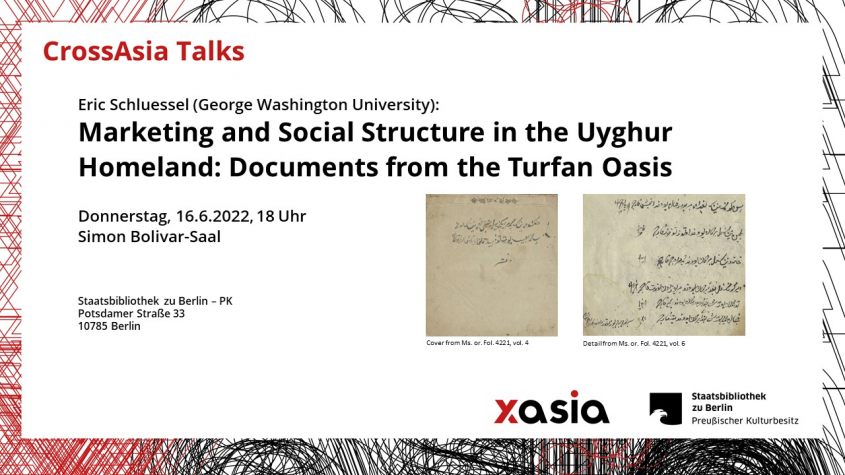Marketing and Social Structure in the Uyghur Homeland. Documents from the Turfan Oasis
(See English below)
Wir freuen uns Ihnen den zweiten Vortrag in unserer Vortragsreihe „CrossAsia Talks“ ankündigen zu dürfen.
Eric Schluessel (George Washington University) wird am 16.06. ab 18 Uhr im Simon Bolivar-Saal (Potsdamer Straße 33, 10785 Berlin) unter dem Titel „Marketing and Social Structure in the Uyghur Homeland: Documents from the Turfan Oasis“ aktuelle Einblicke in seine Forschung geben.
Newly discovered manuscripts from the State Library of Berlin reveal new facets of village life in the Uyghur homeland of Xinjiang, China (East Turkestan) in the 1890s. These documents show how ordinary merchants, artisans, and farmers navigated an economy that was increasingly oriented to the market and towards China proper. From merchants‘ notebooks, legal documents, and grain relief records, we see networks of market actors, even families, emerge.
Die Vortragssprache ist Englisch. Wir bitten Sie um Voranmeldung für den Vortrag unter: ostasienabt@sbb.spk-berlin.de und eine kurze Mitteilung falls Sie einen barrierefreien Zugang benötigen. Die Veranstaltung wird gefilmt.*
Wenn Sie bereits neugierig geworden sind, können Sie schon jetzt in seinem Blogbeitrag „The World of a Nineeenth-Century Uyghur Village“ stöbern.
Der Vortrag wird darüber hinaus via Webex gestreamt und aufgezeichnet. Sie können am Vortrag über Ihren Browser ohne Installation einer Software teilnehmen. Klicken Sie dazu unten auf „Zum Vortrag“, folgen dem Link „Über Browser teilnehmen“ und geben Ihren Namen ein.
Alle bislang angekündigten Vorträge finden Sie hier. Die weiteren Termine kündigen wir in unserem Blog und auf unserem Twitteraccount an.
—
Eric Schluessel (George Washington University) will present an update on his research, entitled „Marketing and Social Structure in the Uyghur Homeland: Documents from the Turfan Oasis,“ on 16 June at 6 pm in the Simon Bolivar-Saal of the Staatsbibliothek zu Berlin (Potsdamer Straße 33, 10785 Berlin).
Newly discovered manuscripts from the State Library of Berlin reveal new facets of village life in the Uyghur homeland of Xinjiang, China (East Turkestan) in the 1890s. These documents show how ordinary merchants, artisans, and farmers navigated an economy that was increasingly oriented to the market and towards China proper. From merchants‘ notebooks, legal documents, and grain relief records, we see networks of market actors, even families, emerge.
The lecture will be held in English. We kindly ask you to register in advance at: ostasienabt@sbb.spk-berlin.de, and to let us know if you need barrier-free access. The event will be filmed.*
If you are already curious, you can have a look at his blog post „The World of a Nineteenth-Century Uyghur Village.“
The lecture will also be streamed and recorded via Webex. You can take part in the lecture using your browser without having to install a special software. Please click on the respective button “To the lecture” below, follow the link “join via browser” (“über Browser teilnehmen”), and enter your name.
You can find all previously announced lectures here. We will announce further dates in our blog and on Twitter.


 SBB
SBB SBB
SBB